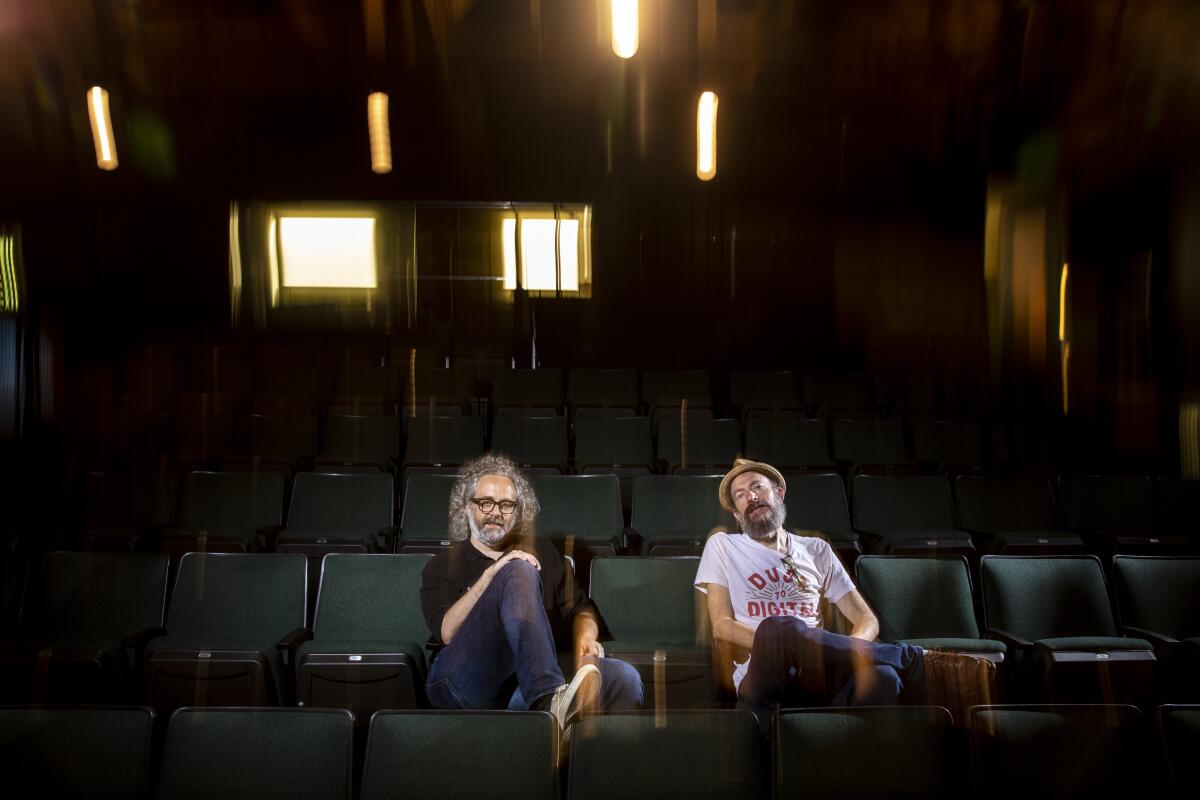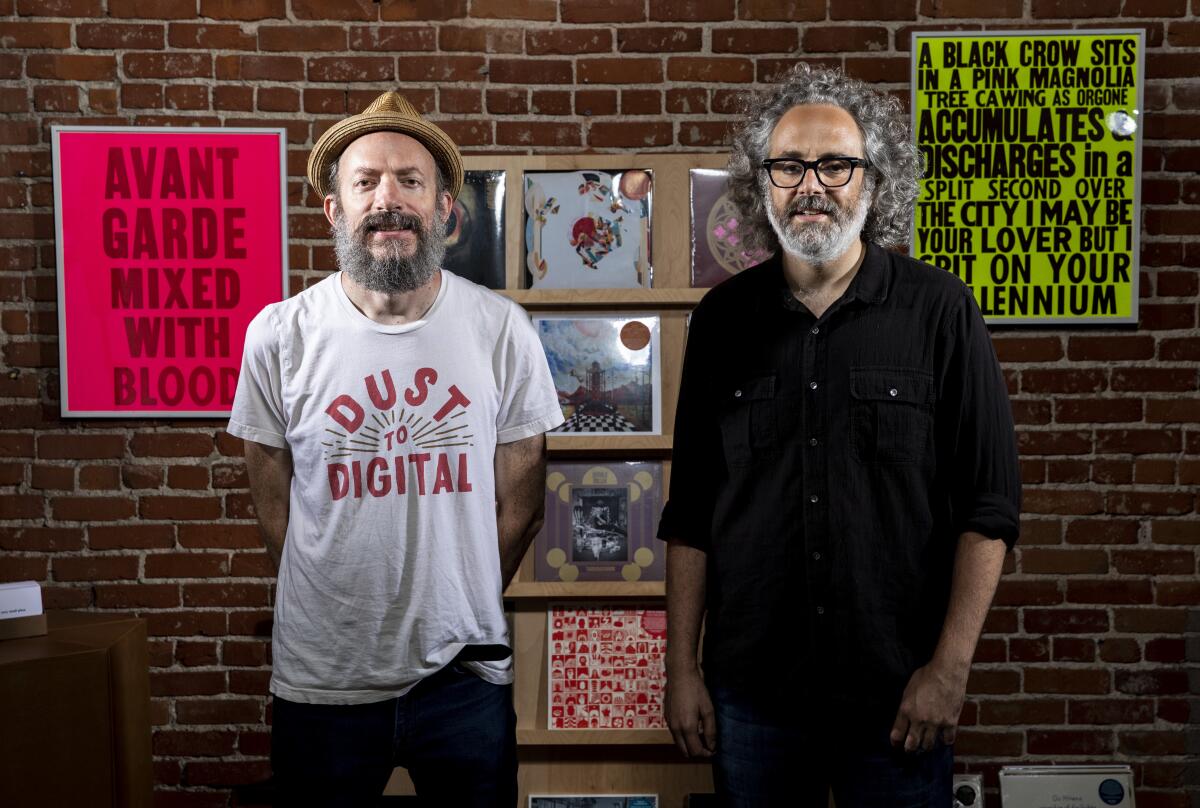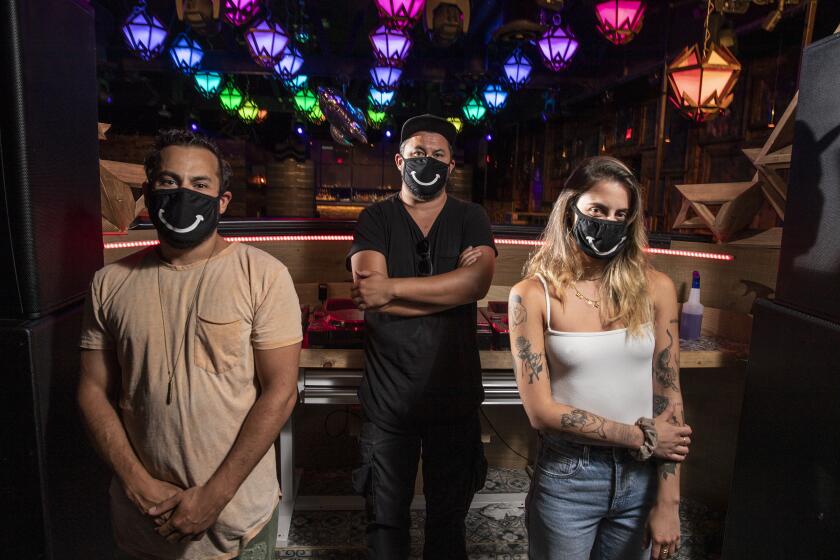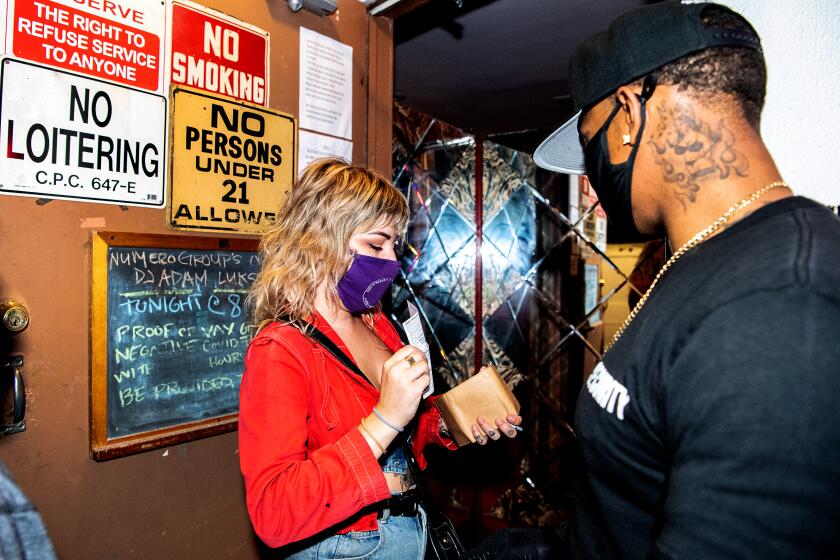L.A.’s Bootleg Theater, a COVID-19 casualty, re-emerges as 2220 Arts + Archives

Though no one knew it at the time, the experimental guitarists-banjoists Eugene Chadbourne and Wendy Eisenberg would end up giving the final performance on the Bootleg Theater’s stage. It was March 9, 2020. The pandemic was bearing down on America and gutting nightlife.
As the weeks turned to months, the Filipinotown club, which for two decades served as a launching pad for countless artists, eventually announced that it, like other crucial small venues including the Blue Whale and the Satellite, was shuttering for good.
The musician and record label owner Peter Kolovos, 44, had no idea that the Bootleg’s coda would be scored by improvised banjo. He produced that night of five- and six-stringed chaos, one of many that he’s facilitated as founder of Black Editions, a label group and concert series. Before the pandemic, Kolovos often booked programs at the Bootleg.
Eighteen months later, he and his friend and collaborator of two decades, Andrew Maxwell, 49, the cofounder of the writers salon the Poetic Research Bureau, are owners of 2220 Arts + Archives, which bought the building for an undisclosed amount after the Bootleg complex went up for sale in the summer of 2020 with an asking price of $5.25 million.
An oral history of the coronavirus pandemic, as told by the staffs of four iconic L.A. nightclubs: the Troubadour, McCabe’s Guitar Shop, Sound and the Satellite
“It was very serendipitous, let’s put it that way,” Kolovos says on a recent afternoon, sitting at a bar table with Maxwell in the front room of the long-ago bra factory. “It was a decision point for us. Can we do this? Should we try it?”
The renovated performance space, bar and archives will open to the public Monday with a solo performance by jazz pianist Jason Moran. From there the programming veers in wildly eclectic directions, executed by a cross-disciplinary collective of curators, promoters and archivists. The complex, which spans 2214-2220 Beverly, features a total of nearly 8,500 square feet of performance, theater and office space.
In addition to Black Editions and the PRB, the facility will house long-running film programming organization the LA Filmforum, whose former home, the Egyptian, was purchased by Netflix last May; writer, dancer and archivist Harmony Holiday’s Mythscience Archives of recorded jazz and poetry; performance organization Pehrspace; Steve Lowenthal’s experimental guitar label Vin du Select Qualitite (which is part of the Black Editions Group); the Acropolis Cinema screening series; and the Unwrinkled Ear, which has curated performances by an essential roster of international improvisational artists.
“Rescuing those smaller clubs that died during the pandemic is in our mission,” says Maxwell, who’s the managing director. An experimental musician, writer, publisher and DJ on KXLU, until recently his lucrative day job involved taxonomy and machine learning for Snapchat and Google. But last year he switched from digital platforms to the plank-and-nail kind as part of a long-strategized lifestyle shift. He founded the PRB with the writer and taxonomist Joseph Mosconi.
They characterize the Bureau as “an extended community of autodidacts and guessworkers caught up in language inquiry and the unguarded arts,” and “a valise fiction and portable literary service in the public domain.”

Patrick Shiroishi, Descension
Kolovos’ paycheck comes from his work with his family’s Westside real estate investment and development business, he says, a job that “helps stabilize stuff and make things happen.”
“That’s the devil’s bargain we’ve made, is that Peter will keep working and I’ll donate all my labor and time to the space,” Maxwell says with a laugh. He describes 2220’s vision as “Lincoln Center meets the Smell,” connecting the highbrow New York arts institution with the downtown L.A. punk club. That draws a chuckle from Kolovos.
“I think we actually met at the Smell downtown,” Maxwell says of his friend, “where he was playing some aggressively abstract music — and I was like, ‘What the hell is this?’”
The pair had been pining for something with what Maxwell describes as “the funk of these feral spaces we grew up in” when the Bootleg closed. Both were part of Open City, a turn-of-the-century noise band.
They’ve remained friends ever since, and in that time Kolovos’ labels have issued defiantly non-commercial releases by artists including the acclaimed New York duo 75 Dollar Bill, L.A. saxophonist and composer Patrick Shiroishi, the meditative Oakland-based guitarist Chuck Johnson (which was released on VDSQ) and dozens more.
Black Editions is perhaps best known for the acclaimed collection of left-field Japanese rock, “Tokyo Flashback: Psychedelic Speed Freaks,” part of a deal with Japanese experimental label P.S.F. More recently, Kolovos secured the rights to the audio archives of late jazz percussionist and educator Milford Graves. A guitarist, Kolovos has released two solo albums for Thin Wrist.
Clubs, musicians and promoters are all adjusting on the fly to the new surge of COVID-19 infections. Many now require proof of vaccination to attend events.
2220 Arts + Archives’ arrival comes at a pivotal time for small L.A. venues and organizations. As the Los Angeles creative community tentatively emerges from isolation and returns to physical spaces, it does so absent many intimate options that cater to niche programming.
“All of us at different times had looked at properties or told one another about places that were up for rent, but it halted for most of the pandemic,” says writer and archivist Holiday. When Holiday, whose songwriting and R&B-singing father Jimmy Holiday co-wrote songs including the Jackie DeShannon hit “Put a Little Love in Your Heart” and Sonny & Cher’s “All I Ever Need Is You,” learned the Bootleg might be for sale, she didn’t get her hopes up. She’s witnessed potential spaces get snatched up by developers.
“Finding spaces has been very tenuous for a long time,” Kolovos says. “Oftentimes those artists and works that I really love and see value in don’t have a space. Towering figures of avant-garde and experimental music couldn’t put two pennies together and struggle.”

In its mission statement, 2220 describes itself as “not profit-seeking, nor looking to build a brand, push product, or curate for clout.” One intention, it continues, is an attempt to “avoid museumification or over-administration — to stay scrappy, self-organizing and DIY for as long as possible.”
That attitude helped Holiday commit to locating her Mythscience Archive at the facility, where she’ll be one of a number of curators. She’d met Maxwell as part of the PRB, she says, and became convinced the archive would have a good home on Beverly Boulevard. Currently, Holiday is working with the New York-based Poetry Project to produce unreleased recordings of the late writer Amiri Baraka. Mythscience will then present an event with a yet-unannounced rapper, who’ll work with the facility to bring to the stage a performative adaptation.
Central to the mission too is a physical archive and shop that will house literature, artwork and music. Kolovos has been collecting, assembling and curating audio recordings for decades; PRB has been archiving ephemera and publications from every writer that’s appeared in the space.

75 Dollar Bill, I Was Real
For Holiday, the magnet wasn’t only “the creative freedom and vision in the hearts of the people who are coming in,” but the social environment the operation will be entering. “If you’re going to rebuild, Phoenix-rising-from-the-ashes style, you might as well do what you’ve always wanted to do. We’ve seen everything ripped out from under us overnight, so why not go big?”
In addition to Moran’s inaugural performance, the first month promises a feast of opportunities to ease back into communal appreciation. On Wednesday, Acropolis will present “Casting Blossoms to the Sky,” the first film in the late director Nobuhiko Obayashi’s “Tragedies of Youth” war trilogy. The film’s Los Angeles premiere, the evening is co-presented by the Yanai Initiative for Globalizing Japanese Humanities. On Saturday, the PRB will present a reading by poets Feliz Lucia Molina, Will Alexander, Brian Kim Stefans, each of whom is celebrating the publication of a new book.
Later in September and in October, FilAm Arts, a Filipino-American arts collective, will present burlesque featuring Mizon Garde; and crucial jazz players William Parker and Hamid Drake, who have been collaborating together for decades, will improvise alongside dancer and poet Patricia Nicholson.
Maxwell describes 2220’s long-term aspirations as “to try to mix the arts, which happens in so few spaces in L.A. Everybody lives in their compartments to a certain degree, so the idea of trying to bring film and music and literature and performance together is very exciting. The unique nature of this complex allows us to do that, even moving from room to room.”
More to Read
The biggest entertainment stories
Get our big stories about Hollywood, film, television, music, arts, culture and more right in your inbox as soon as they publish.
You may occasionally receive promotional content from the Los Angeles Times.













